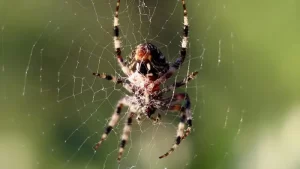Breadcrumbs
These links will help you get back to where you want to go faster.

Natural and Organic Spider Control Using Plants and Flowers
Strongly scented plants, specifically herbs, can deter spiders from invading the home. Spiders are always looking for food and heat. That is why they venture in to the home. Spider webs can accumulate quickly and as soon as they abandon them, they acquire lint and dust. That, and nobody enjoys having a spider stroll throughout the kitchen floor.
Spiders do not like indoor or outdoor plants in the article below. You can put these plants in containers as well as backyard beds. For the vegetation to work as spider repellents, place the vegetation in key areas spiders are likely to enter your home, such as near doors, windows, and different entryways.
Basil
Spider’s do not like basil. Spiders do not like the smell of any Basil (Ocimum basilicum) including cinnamon, thai, lemon and genovese. It can be grown inside the home as well as outside.
Lavender
Use English lavender (Lavandula spp.) to repel spiders, it is the strongest scent of the Lavender varieties.
Mint
Poisonous if ingested (hazard warning for anyone looking to drink peppermint oil) but of the strongest scent making this plant a favorite among homeowners.
Rosemary
Rosemary is a beautiful name (Salvia rosmarinus) and will give your home or backyard a great scent, and keep the spiders out. If you supply it lots of light, you can have rosemary year-round.
Lemon Balm
In Arizona, lemon trees are very popular. Not only is it a good fruit but its’ seed spreads fairly quickly. Lemon Balm is an excellent product of the lemon family.
Citronella Grass
Because it won’t overwinter in most climates, citronella grass (Cymbopogon nardus) has a lemon scent that whispers from its’ blades – it deters spiders as well as mosquitoes and a variety of other insects.
Lemon Verbena
Native to South American Countries Argentina and Chile, lemon verbena (Aloysia citriodora) is additionally a scrumptious culinary herb that you can use for drinks, desserts, and jams.
Sage
Aroma is the strongest with Sage. All sage will deter spiders, but if you favor to plant one especially for its scent, Cleveland sage (Salvia clevelandii), a native of California, is the one you want to go with.
Dill
Dill (Anethum graveolens) grows quick, and then stops producing its fragrance after it blooms. For a steady provide of dill, reseed it about each and every 4 to six weeks from spring to late summer.
Chives
Chives (Allium schoenoprasum) Its’ onion scent makes spiders very unhappy. It’s a low-maintenance perennial herb, like other contributors of the onion family, are poisonous to puppies and cats.
Catnip
This perennial spreads fast. Catnip (Nepeta cataria) is regularly grown in containers and can be planted and nurtured both inside and outside. If catnip begins to get unruly or messy just reseed it.
Marigolds
The robust scent of marigolds (Tagetes spp.) makes these bright flora an effective insect and spider repellent as well as a sight to see. Mexican marigolds (Tagetes erecta) have the strongest scent and are the tallest. That makes them some of the most popular integrated pest management solutions. When they are not in bloom, marigold plants have nearly no scent and their leafy components act as a repellent for most insects.
Eucalyptus
The menthol-smell of a eucalyptus makes it very appealing. This is also repels spiders and other insects so if you can grow it indoors as an houseplant, you will get rid of a lot of pests, and a great smelling home people will love to visit. When grown indoors as a houseplant, eucalyptus (Eucalyptus cinerea) grows 6-10 feet.
Conclusion
Not all spiders are a nuisance. Do what you can to keep them away from your resident and domesticated areas, however, leave them bee while they are outdoors. They help eat insects that you don’t want in your home. They act as a great integrated pest control methods if possible. Garden spiders are a great organic and natural pest control repellent for mosquitoes or flies and on those that can wreak havoc on your plants such as aphids, beetles, wasps, and stink bugs. Beneficial spiders in your yard consist of orb weavers, leaping spiders, and sac spiders.

